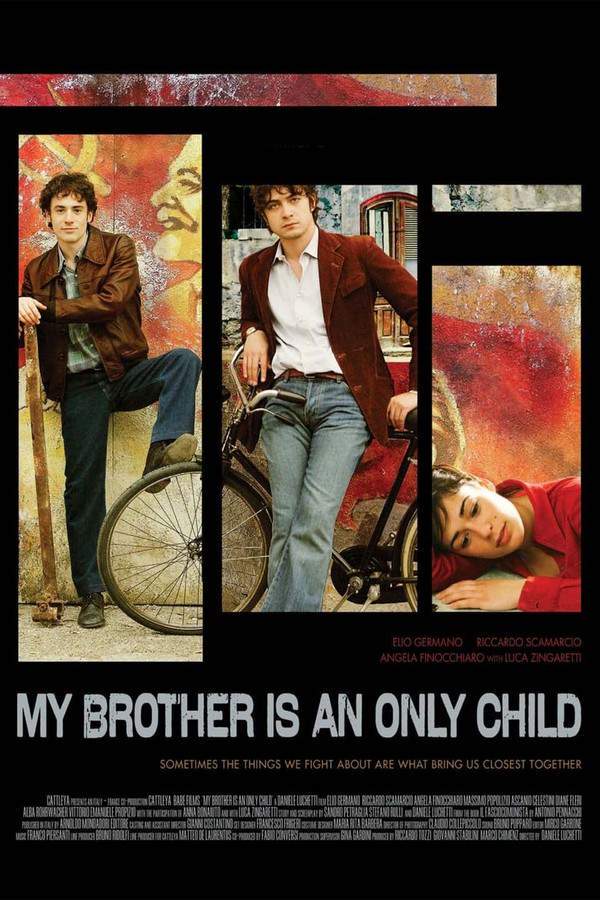My Brother Is an Only Child 2008

Set in 1960s Italy, this film explores the diverging lives of two brothers in a community grappling with political unrest. The elder, Manrico, becomes a leader within the Communist party, while his younger brother, Accio, aligns himself with the Fascists. Their differing beliefs fuel a fierce rivalry, complicating matters of love and loyalty as they confront the painful repercussions of their choices and the divisions within their town.
Does My Brother Is an Only Child have end credit scenes?
No!
My Brother Is an Only Child does not have end credit scenes. You can leave when the credits roll.
Meet the Full Cast and Actors of My Brother Is an Only Child
Explore the complete cast of My Brother Is an Only Child, including both lead and supporting actors. Learn who plays each character, discover their past roles and achievements, and find out what makes this ensemble cast stand out in the world of film and television.
No actors found
External Links and Streaming Options
Discover where to watch My Brother Is an Only Child online, including streaming platforms, rental options, and official sources. Compare reviews, ratings, and in-depth movie information across sites like TMDb, Wikipedia, Rotten Tomatoes or Metacritic.
Ratings and Reviews for My Brother Is an Only Child
See how My Brother Is an Only Child is rated across major platforms like IMDb, Metacritic, and TMDb. Compare audience scores and critic reviews to understand where My Brother Is an Only Child stands among top-rated movies in its genre.

71
Metascore
tbd
User Score


84%
TOMATOMETER

78%
User Score

67
%
User Score
Take the Ultimate My Brother Is an Only Child Movie Quiz
Challenge your knowledge of My Brother Is an Only Child with this fun and interactive movie quiz. Test yourself on key plot points, iconic characters, hidden details, and memorable moments to see how well you really know the film.
My Brother Is an Only Child Quiz: Test your knowledge about the political and personal battles faced by the brothers in 1960s Italy.
What political ideology does Accio initially align himself with?
Fascism
Communism
Socialism
Anarchism
Show hint
Full Plot Summary and Ending Explained for My Brother Is an Only Child
Read the complete plot summary of My Brother Is an Only Child, including all major events, twists, and the full ending explained in detail. Explore key characters, themes, hidden meanings, and everything you need to understand the story from beginning to end.
Accio (Elio Germano) and Manrico (Riccardo Scamarcio) are working-class siblings navigating life in Italy during the tumultuous 1960s. Accio, the impulsive younger brother, finds himself influenced by a market trader and eventually joins the Fascist party, taking pride in the nickname “Bully,” which lends him an air of toughness. This alarming shift deeply concerns Manrico and their sister Violetta, especially when they overhear Accio engrossed in Benito Mussolini’s speeches within the confines of his room. The sibling rivalry escalates with Manrico often resorting to physical torment, like submerging Accio’s head in a barrel beneath the drainpipe of their dilapidated home.
The tension builds when Accio, in a fit of rebellion, runs away upon discovering their mother’s support for the Houses Party, believing they’ll provide the aid needed to rebuild their crumbling house.
As they mature, Accio and Manrico become increasingly active in their respective political movements—the Fascist party and the Communist movement—exemplified by scenes depicting factory occupations and the temporary takeover of the Rome conservatoire, where Violetta studies the cello. The film tackles political themes with surprising fairness; while the young fascists appear ridiculous with their fervent chants of “Duce! Duce!” and a growing propensity for violence, the communists reveal their own absurdities when they replace Schiller’s final movement of Beethoven’s choral symphony with a hymn celebrating historical figures like Mao Zedong, Vladimir Lenin, and Joseph Stalin.
Francesca, Manrico’s girlfriend, unexpectedly forms a bond with Accio, who harbors secret feelings for her and doubts Manrico’s reliability. Complicated emotions emerge as Accio becomes involved with the wife of his imprisoned fascist friend, enjoying luxuries like a car she purchases for him via an installment plan.
Eventually, a turning point arrives for Accio when he renounces the Fascist party, dramatically tearing up his membership card after witnessing party members vandalize his brother’s car. His relationship with the older woman also crumbles as he admits his feelings for someone else, leaving her to ponder whether he is loved in return.
Contrastingly, Manrico descends deeper into the chaos of revolutionary violence. After a two-year absence, he reaches out to Accio, prompting him to meet in a café. During this reunion, Accio tries to call Francesca, who repeatedly hangs up. When they finally meet, Manrico spots Francesca’s unexpected arrival alongside police potentially tracking her. In a frantic escape attempt, he ultimately loses his life in a gunfight with the authorities.
The story concludes with Accio taking matters into his own hands, infiltrating a corrupt housing office to seize keys and records meant for the homeless. Distributing keys to desperate families in the dead of night symbolizes his newfound resolve. The film closes on a poignant note as Accio reunites with his family, now including his brother’s young son, embodying both personal loss and a commitment to a brighter future.
Uncover the Details: Timeline, Characters, Themes, and Beyond!

Coming soon on iOS and Android
The Plot Explained Mobile App
From blockbusters to hidden gems — dive into movie stories anytime, anywhere. Save your favorites, discover plots faster, and never miss a twist again.
Sign up to be the first to know when we launch. Your email stays private — always.
Watch Trailers, Clips & Behind-the-Scenes for My Brother Is an Only Child
Watch official trailers, exclusive clips, cast interviews, and behind-the-scenes footage from My Brother Is an Only Child. Dive deeper into the making of the film, its standout moments, and key production insights.
My Brother Is an Only Child Other Names and Titles
Explore the various alternative titles, translations, and other names used for My Brother Is an Only Child across different regions and languages. Understand how the film is marketed and recognized worldwide.
Quick Links: Summary, Cast, Ratings, More

What's After the Movie?
Not sure whether to stay after the credits? Find out!
Explore Our Movie Platform
New Movie Releases (2026)
Famous Movie Actors
Top Film Production Studios
Movie Plot Summaries & Endings
Major Movie Awards & Winners
Best Concert Films & Music Documentaries
Movie Collections and Curated Lists
© 2026 What's After the Movie. All rights reserved.














